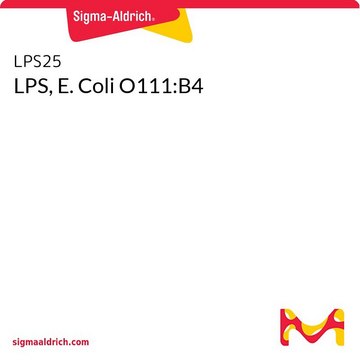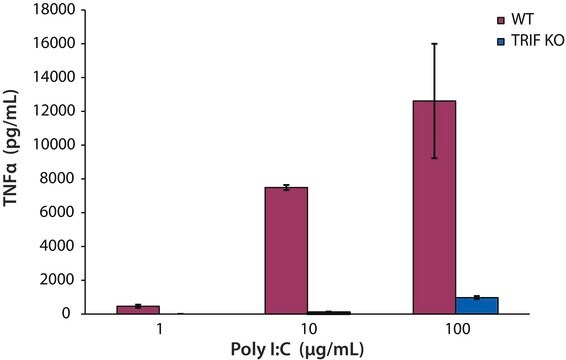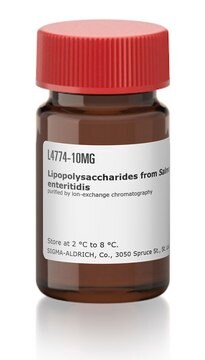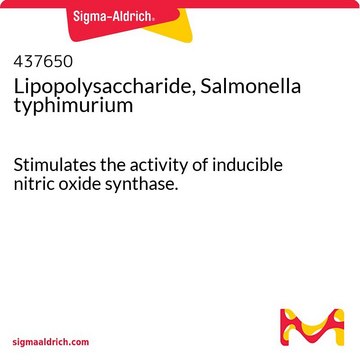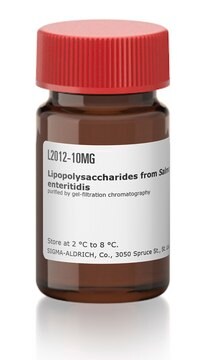L6143
Lipopolysaccharides from Salmonella enterica serotype typhimurium
suitable for cell culture, BioXtra, γ-irradiated
Synonym(s):
LPS
Sign Into View Organizational & Contract Pricing
All Photos(2)
About This Item
Recommended Products
biological source
Salmonella enterica (serotype typhimurium)
Quality Level
sterility
γ-irradiated
product line
BioXtra
form
lyophilized powder
purified by
gel-filtration chromatography
technique(s)
cell culture | mammalian: suitable
impurities
<1% Protein (Lowry)
storage temp.
2-8°C
Looking for similar products? Visit Product Comparison Guide
Application
Lipopolysaccharides from Salmonella enterica serotype typhimurium has been used:
- in mice to elicit the secretion of pro-inflammatory cytokines
- to induce cytokine production in monocytes
- to elicit the activation of NF-κB pathway in mouse dendritic cells.
- to induce inflammatory response in human colon adenocarcinoma Caco-2 cells
- for stimulation of the catfish peripheral blood leukocytes (PBLs) to study estrogen receptor mRNA expression
Lipopolysaccharides (LPSs) are characteristic components of the cell wall of Gram-negative bacteria. LPS and its lipid A moiety stimulate cells of the innate immune system by the Toll-like receptor 4 (TLR4), a member of the Toll-like receptor protein family, which recognizes common pathogen-associated molecular-patterns (PAMPs).
Biochem/physiol Actions
LPS is a major constituent of the cell wall of most gram negative bacteria. It is a highly immunogenic antigen with the ability to enhance immune responses to soluble antigens. LPS also acts as a specific mitogen for bone marrow derived B lymphocytes from mice, rabbits, chickens, cows, hamsters, and humans.
Reconstitution
Lipopolysaccharides are supplied as lyophilized, γ-irradiated powders. To reconstitute, add 1 ml sterile balanced salt solution or tissue culture medium to the vial (1 mg) and gently swirl until the powder dissolves. Reconstituted product may be further diluted to desired working concentrations using sterile balanced salt solution or tissue culture medium.
Other Notes
To gain a comprehensive understanding of our extensive range of Lipopolysaccharides for your research, we encourage you to visit our Carbohydrates Category page.
related product
Product No.
Description
Pricing
Signal Word
Warning
Hazard Statements
Precautionary Statements
Hazard Classifications
Acute Tox. 4 Dermal - Acute Tox. 4 Inhalation - Acute Tox. 4 Oral
Storage Class Code
11 - Combustible Solids
WGK
WGK 3
Flash Point(F)
Not applicable
Flash Point(C)
Not applicable
Personal Protective Equipment
dust mask type N95 (US), Eyeshields, Gloves
Choose from one of the most recent versions:
Already Own This Product?
Find documentation for the products that you have recently purchased in the Document Library.
Customers Also Viewed
Guangwei Xu et al.
Journal of enzyme inhibition and medicinal chemistry, 33(1), 1089-1094 (2018-06-23)
Indoleamine 2,3-dioxygenase 1 (IDO1) activity links to immune escape of cancers. Inhibition of IDO1 provides a new approach for cancer treatment. Most clinical IDO1 drugs show marginal efficacy as single agents. On basis of molecular docking and pharmacophore modelling, a
Ju Huang et al.
Proceedings of the National Academy of Sciences of the United States of America, 106(15), 6226-6231 (2009-04-03)
Autophagy plays an important role in immunity to microbial pathogens. The autophagy system can target bacteria in phagosomes, promoting phagosome maturation and preventing pathogen escape into the cytosol. Recently, Toll-like receptor (TLR) signaling from phagosomes was found to initiate their
Luke R Iwanowicz et al.
Fish & shellfish immunology, 40(1), 109-119 (2014-06-29)
Estrogens are recognized as modulators of immune responses in mammals and teleosts. While it is known that the effects of estrogens are mediated via leukocyte-specific estrogen receptors (ERs) in humans and mice, leucocyte-specific estrogen receptor expression and the effects of
Chun-Yan Yeung et al.
Gastroenterology research and practice, 2013, 973209-973209 (2013-07-11)
Background. Lactobacillus shows beneficial anti-inflammatory effects on Salmonella infection. The maintenance of the tight junction (TJ) integrity plays an importance role in avoiding bacterial invasion. Whether Lactobacillus could be used to regulate the TJ protein expression and distribution in inflamed
Marie-Elise Bonnet et al.
Pharmaceutical research, 25(12), 2972-2982 (2008-08-19)
The success of nucleic acid therapies depends upon delivery vehicle's ability to selectively and efficiently deliver therapeutic nucleic acids to target organ with minimal toxicity. The cationic polymer polyethylenimine (PEI) has been widely used for nucleic acid delivery due to
Our team of scientists has experience in all areas of research including Life Science, Material Science, Chemical Synthesis, Chromatography, Analytical and many others.
Contact Technical Service
